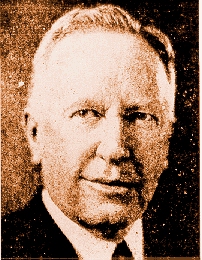
Hamilton County Criminal Court Judge Samuel McReynolds, the judge who sentenced Ed Johnson to die and a month later watched from his courtroom window as Johnson was dragged out of jail and hanged, earlier played a more noble role. On the night of Johnson's arrest, it was thirty-five-year old McReynolds who took the lead in suppressing the first attempt to lynch Ed Johnson. Seeing the mob gathering in front of the County Jail, McReynolds alerted Governor Cox, who in turn called out the National Guard. McReynolds then went to the jail. Arriving at the mob scene, McReynolds was told by someone in the crowd, "The jury is in, Judge--and we find him guilty and sentence him to hang by the neck until he is dead." "Go home," McReynolds answered.
McReynolds was pulled in two directions in the Johnson case: he believed in the rule of law, but he was politically ambitious and saw the need to satisfy the public's demand for swift and harsh retribution for the rape of Nevada Taylor. He put the trial on a fast track to head off more lynch mob attacks and informed defense attorneys that any attempt to seek a change of venue would be denied. When the jury returned its conviction, he told them that they had been "one of the best" juries he'd ever seen and that he "had no doubt from the proof in the case that the defendant is the guilty party."
McReynolds was outraged by the decision of Federal District Judge Clark to delay Johnson's execution for ten days to allow time for an appeal to the Supreme Court. He took the action as a personal insult and thought that it reflected an arrogant contempt for the state court system. Discusssing the federal court's order with the prosecutor and other lawyers, McReynolds suggested the possibility of ignoring the order and executing Johnson on the originally scheduled date--then thought better of the idea.
When the mob began assembling in front of the jail after the U. S. Supreme Court ordered a further delay in Johnson's execution, McReynolds watched the unfolding action with District Attorney Whitaker from a ringside seat in the courthouse. One hour before the mob began its assault on the jail, the judge notified Milton Ochs, managing editor of the Chattanooga Times, of the developing news story on Walnut Street. Told by Ochs that he ought to alert Sheriff Shipp, McReynolds replied, "No. I will have nothing to do with it since the Supreme Court butted in." The judge returned to the courthouse where he remained until the mob had finished its dirty work.
The Justice Department considered naming McReynolds as a defendant in the contempt case, but Attorney General Moody decided against it. The Court's order instructed the sheriff and his deputies, but not the judge. In addition, there was no evidence directly linking McReynolds to the lynching.
Tennessee voters elected McReynolds to the U. S. Congress in 1921, where he served for eighteen years. At the time of his death, McReynolds was chairman of the House Foreign Relations Committee. Among those who came to Chattanooga for his funeral in July 1939 were Harry Truman and Albert Gore, Sr.
